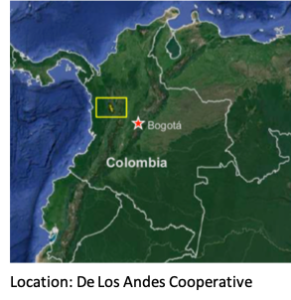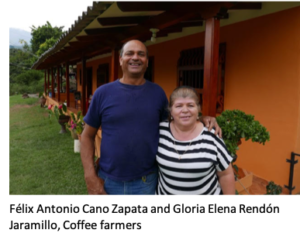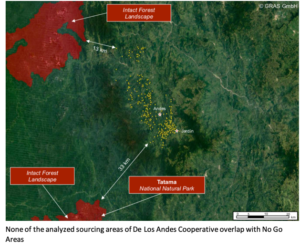4C Services has become a partner in the Sustainable Coffee Challenge. This strengthens and confirms our commitment to promote deforestation-free coffee supply chains and to support initiatives to mitigate the climate change impact. We also believe that this decision will pave the way for collaboration with other stakeholders that are committed to address the challenging issues of the coffee sector. “We are pleased to welcome 4C Services as a partner in the Sustainable Coffee Challenge and commit to work collaboratively to make coffee the world’s first sustainable agricultural product”, says Bambi Semroc, Vice President, Sustainable Markets & Strategy at Conservation International.
The Sustainable Coffee Challenge is a collaborative effort of companies, governments, NGOs, research institutions and others to transition the coffee sector to be fully sustainable. Challenge partners are urgently working together to increase transparency, align around a common vision for sustainability and collaborate to accelerate progress towards those goals. The Challenge is facilitated by Conservation International, with the agenda and actions led by Challenge partners. Together, these change makers work to find solutions for the coffee community.
To find out more about the Sustainable Coffee Challenge, please click here.
Global Coffee Report, July/August 2019
Common Code for the Coffee Community (4C) Services says climate change is having a significant impact on coffee production. Farmers rely on a well-functioning ecosystem, but extreme weather conditions such as sudden, heavy rainfalls are causing huge damages and exposing crops to increased risk of pests and diseases.
Myriel Camp, Program Manager of 4C Services, says to mitigate these effects, coffee producers should apply good agricultural practices and maintain and restore biodiversity through shade management and biological pest controls.
“The main coffee producing regions are in tropical, biodiverse areas. Many regions in those countries are at risk, especially with increasing temperatures leading to producers looking for higher grounds where the temperature is more suitable for them to grow coffee. This might include forests,” Camp tells Global Coffee Report.
This is one of several reasons Camp says coffee farmers could be causing deforestation by converting forests into production areas.
“Another possibility could be that small producers don’t have the means, knowledge, or capacity to increase income through improved production techniques and yields. Often, the only option they see is to expand production into new areas,” Camp says. “Impact oriented certification can provide an opportunity to help them out of this situation through access to training, increased productivity, and additional market access.”
Click here to read the full article
Cologne, 16 April 2019
We are happy to announce that 4C Services has been accepted as a member of the German Coffee Association (Deutscher Kaffeeverband – DKV). The membership starts 1st of May 2019.
The German Coffee Association represents the interests of the German coffee sector and counts more than 250 members. The overarching goals of the Association are the achievement of positive conditions for the coffee industry, the competent support of its members and the promotion of a positive image for coffee in Germany.
Click here for further information on the German Coffee Association.
 More than four hundred smallholder farmers in the municipality of Jardin in Colombia have chosen 4C certification to grow coffee more productively and sustainably. They are all members of the De Los Andes Cooperative, a non-profit organization founded in 1961, which is committed to ensure that growers receive a fair share for their effort. The cooperative is located in Andes, Antioquia, one of the major coffee growing regions of Colombia.
More than four hundred smallholder farmers in the municipality of Jardin in Colombia have chosen 4C certification to grow coffee more productively and sustainably. They are all members of the De Los Andes Cooperative, a non-profit organization founded in 1961, which is committed to ensure that growers receive a fair share for their effort. The cooperative is located in Andes, Antioquia, one of the major coffee growing regions of Colombia.
The Cooperative has been involved with 4C since 2014. Farmers are proud to participate in an international sustainability certification program such as 4C, states Maria Hernandez, Project Director at the De Los Andes Cooperative, as 4C targets sustainability through taking care of the environment, water resources, reforestation and soil conservation as well as looking at social aspects such as good working conditions and respect of human and labour rights. “4C makes the farmers more aware that they have a business which needs good administration and improvement plans to comply with market requirements. Also, 4C is demanding in terms of training, not only for the owner or manager of the farm, but also for workers and the staff on the farm”, outlines Maria the benefits of the 4C System for the farmers.
 Through continuous improvement plans which have to be set up by 4C certified units, impact on the ground with regard to environmental, social and economic sustainability is generated. Support with technical assistance is provided by the De Los Andes Cooperative to its farmers to facilitate the implementation of the measures stated in the improvement plan. For example, with regard to the 4C requirement to conserve and use water resources efficiently, the Cooperative promotes the installation of the best value water treatment system, which have been tested to comply with local regulation. Technicians from the Cooperative provide the farmers with a list of materials and show them how to get the water treatment up and running. The Cooperative also searches for co-funders that would like to help with finance. 4C is continuously working on increasing and better measuring the impact of 4C certification on the ground. Constant dialogue with its certified coffee units provides 4C valuable insights on where further support is required.
Through continuous improvement plans which have to be set up by 4C certified units, impact on the ground with regard to environmental, social and economic sustainability is generated. Support with technical assistance is provided by the De Los Andes Cooperative to its farmers to facilitate the implementation of the measures stated in the improvement plan. For example, with regard to the 4C requirement to conserve and use water resources efficiently, the Cooperative promotes the installation of the best value water treatment system, which have been tested to comply with local regulation. Technicians from the Cooperative provide the farmers with a list of materials and show them how to get the water treatment up and running. The Cooperative also searches for co-funders that would like to help with finance. 4C is continuously working on increasing and better measuring the impact of 4C certification on the ground. Constant dialogue with its certified coffee units provides 4C valuable insights on where further support is required.
 The Cooperative is the first coffee growing cooperative using GRAS (Global Risk Assessment Services)[1], a web-based tool based on remote sensing and GIS technology which provides comprehensive sustainability-related geo-referenced information on biodiversity, land use change, carbon stock and social indices. Occurrence of land use change can be verified by provided heat maps and using a simple to interpret greenness index called the Enhanced Vegetation Index (EVI), which allows to identify the history of the land use and to detect the exact point in time of land use changes. 416 coffee farmers of the De Los Andes Cooperative have been analyzed by GRAS with respect to biodiversity, potential land use change, carbon stock and social indices using a semi-automated methodology for sustainability risk assessment. Based on the assessment, the overall GRAS Index has been calculated in order to identify farmers with a high sustainability risk and to exclude those farmers from certification which have been involved in e.g. the conversion of primary forests.
The Cooperative is the first coffee growing cooperative using GRAS (Global Risk Assessment Services)[1], a web-based tool based on remote sensing and GIS technology which provides comprehensive sustainability-related geo-referenced information on biodiversity, land use change, carbon stock and social indices. Occurrence of land use change can be verified by provided heat maps and using a simple to interpret greenness index called the Enhanced Vegetation Index (EVI), which allows to identify the history of the land use and to detect the exact point in time of land use changes. 416 coffee farmers of the De Los Andes Cooperative have been analyzed by GRAS with respect to biodiversity, potential land use change, carbon stock and social indices using a semi-automated methodology for sustainability risk assessment. Based on the assessment, the overall GRAS Index has been calculated in order to identify farmers with a high sustainability risk and to exclude those farmers from certification which have been involved in e.g. the conversion of primary forests.
Thus, the tool supports the establishment of deforestation free coffee supply chains, which is more and more requested by the markets. Auditors can use it for risk analysis prior to certification. Trainings provide the farmers with the knowledge to prevent further deforestation.
Looking to the future Maria says “De Los Andes is looking forward to further deepening its cooperation with 4C to improve the living conditions of farmers by helping them to increase yields and income and at the same time safeguarding biodiversity and carbon stock. This will go along with developments of partnerships for gender equality and empowerment of women in rural areas.”
Colombian coffee is renowned worldwide for its individual taste and quality. Its unique properties have been given protected designation of origin status by the European Union. The smallholders in the Jardin area produce very good quality Arabica coffee from their farms, each of which is less than five hectares. With 4C, consumers know that one of their favorite coffees will benefit small growers and the environment. De Los Andes is committed to expanding the market for 4C coffee and spreading its messages of ethical and responsible production to the four corners of the world.
About the De Los Andes Cooperative
The De Los Andes Cooperative is the result of the combined efforts of more than 3,600 members, who work every day to generate a better future and achieve sustainable development in the field. On 1200ha of farm land, a subset of more than 400 members are producing 4C compliant coffee with an annual production capacity of 2200 metric tons. Their mission is to actively participate in the sustainable development of the coffee growers, their family and the region. The Cooperative is steadily growing with new associates continuously trained in the principles of working in a cooperative.
About 4C
4C (Common Code for the Coffee Community) was developed in a comprehensive and transparent multi-stakeholder process involving coffee producers, trade and industry as well as various civil society organisations from around the world. The aim of 4C is to move the entire coffee sector towards sustainability. The 4C certification system includes requirements for economic, social and environmental conditions for coffee production and processing in order to establish credible sustainable and transparent supply chains for the coffee sector. Independent certification bodies verify compliance with the 4C requirements. 4C operates in 28 countries and is one of the largest certification systems in the coffee sector.
If you are interested in the 4C System please contact us at info(at)4c-services.org